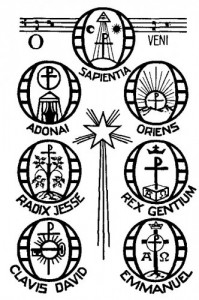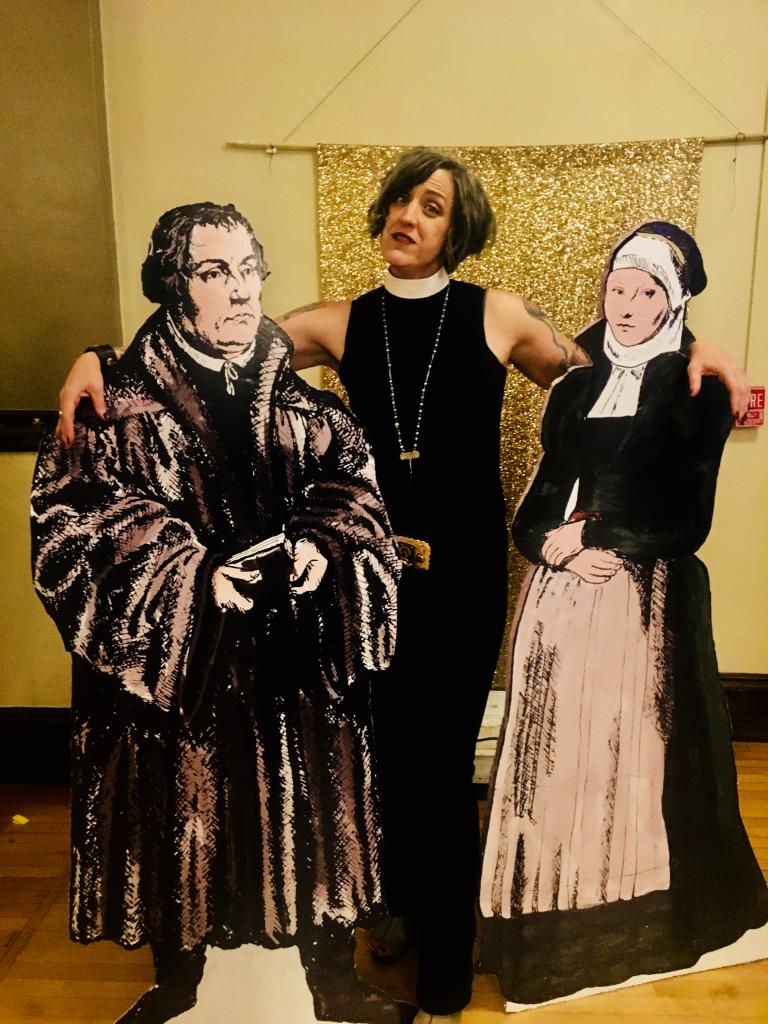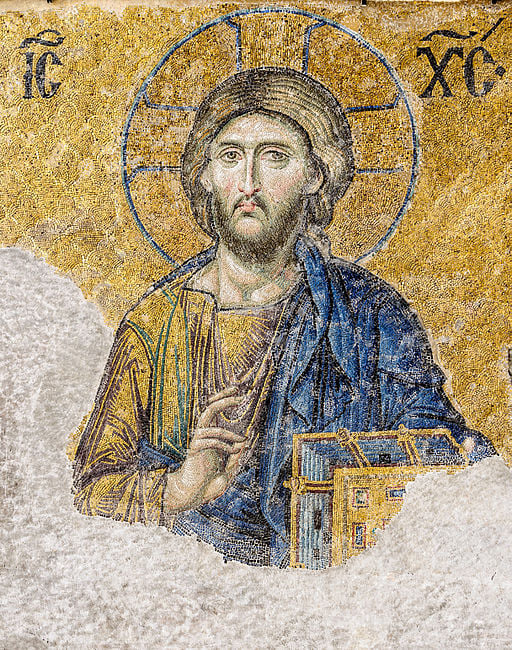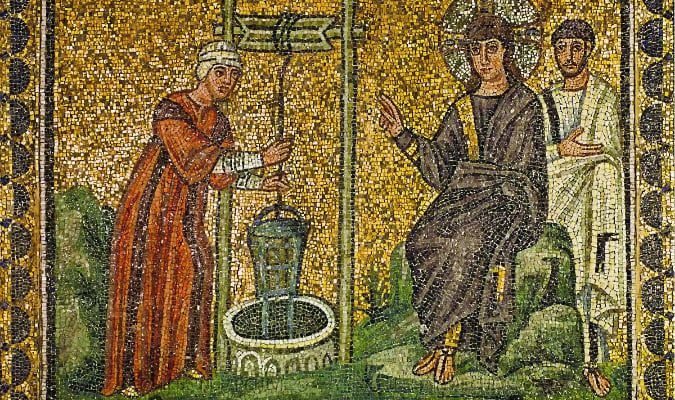2013-12-22 NBW HFASS Sermon 2<—-click here to listen along (this one makes more sense heard rather the read, trust me)
Ok boys and girls, get super excited. Because it’s time once again for Pastor Nadia’s super nerdy liturgical church history lesson.
That’s right. Tonight we are going to learn about what the church calls the O Antiphons.
But first, and this may go without saying, but first I obviously have to tell you about taking Harper to the piercing shop this week. She was wanting to swap out her nose stud for a proper ring and being the good mother I am, I took her to a reputable, local shop to get her jewelry swapped out. Anyhow, the young man at the counter was commenting on my tattoos and when I told him that I was a clergywoman and that some of my tattoos were scenes from the Bible and some were Saints like Mary Magdalen, he lit up and said. Cool man. So…do you ever read weird escoteric things like those Gnostic gospels? And like, do you ever have secret meetings and stuff?”
Well, once I held a Bible study no one showed up for so if FELT like a secret meeting but no. No divinci code here. No secrets.
But as I drove away I thought well, wait a minute, there is the secret in the O antiphons.
Now, lest you think I’m talking about something obscure, let me assure you I am not. Because we have been singing a form of the O Antiphons for the last 4 weeks when we sing O Come O Come Emmanuel.
See, singing the O Antiphons during the last few days of Advent is a tradition that dates back to the 5th century. From Dec 17th to Dec 23rd the O Antiphons are sung at Vespers, which is evening prayer. And each of the 7 antiphons contains a name for the messiah given by the prophet Isaiah – which incidentally have been our Hebrew Bible readings during Advent.
They go like this:
O Wisdom
O Lord
O Root of Jesse
O Key of David
O Morning Star
O King of the Nations
O Emmanuel – meaning God with us.
And since you might be wondering, here’s where the piercing shop dude comes back in: there is, in the original Latin, a hidden code in the O Antiphons, which is totally cool. It’s nothing to do with davinci or secret societies, or thank you Steve Ludwig, Jesus having a baby mama….but if you listen to the rest of this sermon, I’ll totally tell you what it is at the end.
OK. Here’s why any of this matters.
Because here we are. It’s the 4th week of Advent. We have been waiting in the warmth of this winter’s hopefulness. The nights have only gotten longer and so each week we’ve needed one more candle…one more reminder of the light that shines in the darkness and that the darkness cannot overcome it. We have listened to the words of the prophet Isaiah – words that speak of a child to be born. Words written hundreds of years before the birth of Jesus. We have read and sung the first chapter of Luke. We have folded our worship with that of the prophets, and John the Baptists’ parents and Jesus’ mom. We have folded our worship with all who wait and who have ever waited for these words of Zechariah from the benedictus we sung today to be true.
By the tender mercy of our God, the dawn from on high will break upon* us, to give light to those who sit in darkness and in the shadow of death, to guide our feet into the way of peace.
See, we usually think of time and events as a linear progression from one thing to another, a simple line of events – like a string pulled tight. The past is past the future is future and the present is present. Everything stays where it should. But here is the church and especially in our liturgical life together it’s much more like taking that string and bunching it together in our hands (and in our prayers and songs) so that what happened thousands of years ago touches what happens now which touches prayers from the 5th century which touches God’s kingdom reality in what we think of as our future. Here in this place, time does not stay in a neat line but instead is what Doctor Who would call wibbly wobbly timey-wimy stuff. All touching together.
And so this week as we were all living in the midst of these final days of Advent when the O Antiphons are sung, I thought about the Benedictus, By the tender mercy of our God, the dawn from on high will break upon* us, to give light to those who sit in darkness and in the shadow of death, to guide our feet into the way of peace. And given the length of these nights, and the people we have in the hospital and the 2 dead teenagers from my High School and just how painful this time of year can be for so many of you, I just couldn’t preach that a light shines in our darkness. Maybe tomorrow I could, maybe next week or next year but not today. And then I realized I didn’t have to. Because I realized that as Christians we live in the stories and faith of our ancestors, and in the reality of our lives and our world in the moment and in the not yet fulfillment of the kingdom of God – and these things are always touching each other like different points on a string gathered in God’s hands.
And they are all at our disposal for expressing our faith.
So what I am getting at is that instead or preaching a sermon where I proclaim that the light has shattered darkness, I wrote our own O Antiphons so that we could implore the light to come. Because that just felt more honest.
O come, o come Wisdom from on high – You who were, who are and who is. Send your wisdom and cast aside the stupidity that comes from thinking only of ourselves, only of our species, only of our wellbeing, only of our country, only of our religion, only of our historical moment.
O come, O come Lord Jesus. Come and again break open our hearts like only a baby can do. Come again and be born in straw and mud and show us God’s preferential option for the ordinary, the small, the unnoticeable among us. Come and again show us what we always seem to forget – that the divine is so often concealed within the common.
O Come O Come, Root of Jesse – You who are the foundation…When in this time of year, families of origin are sometimes too toxic to claim, remind us once again that we are grafted into the story of you and your people. Come and claim us as your own children so that our belonging to you, to each other and to the saints who came before can be a more reliable and less crazy source of our identity.
O Come O Come Key of David – you who are an opener of prisons and eyes and hearts and new things. Use that key to open the prisons of affluenza and apathy. Come and free us from the bondage of depression and addiction and self-righteousness . Come and free us from the bondage of our secrets and our fears and thinking that the words “reality” and “television” are anything but oxymoronic.
O Come O Come, morning star, shine on those who sit in darkness. Hold the souls of both Claire Davis and Karl Peirson in your eternal light like only you could pull off. Come and dispel the darkness in our own hearts especially when we start believing the lie that a single act of violence, as horrible as it was, is somehow more powerful than every single act of love that happened on the same day.
O Come O Come King of the Nations – you who created all that is and yet emptied yourself of power, come and show us again that we must lose our lives to find them. Heal the nations by bringing your unlikely kingdom of enemy love and cheek turning. May all we who wield power over others fall on our knees and worship the king who was held in a cradle and on a cross.
O Come O Come Emmanuel, God present in our midst long awaited savior and king come and save us O lord our God. As a matter of fact, lets sing that.
And now, as promised, the secret code the monks wrote into the O antiphons some 1500 years ago as they sat in cold chapels chanting in Latin during the longest nights of the year December 17th through 23rd – see, The Benedictines arranged these antiphons with a definite purpose. If you take the first letter of each one—Emmanuel, Rex, Oriens, Clavis, Radix, Adonai, Sapientia—the Latin words ero cras are formed, meaning, “Tomorrow, I will come”. Therefore Jesus, whose coming we Christians have prepared for in Advent and whom we have addressed in these seven titles, now speaks to us: ero cras “Tomorrow, I will come[1].” And he will. He will come again and still and at once and then and now and soon. Amen.
















